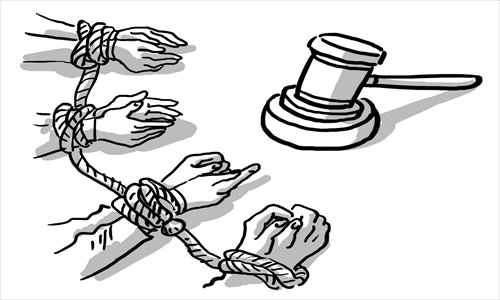Legalized bribery empowers US political elite

The Netflix audience may have been hooked by the wrestling for power, shameless back door deals, the calculating nature of the main character and the insidious role of money in Washington DC portrayed in House of Cards. But politics in New York this spring has been stranger than fiction.
This year so far, two state senators, one city council member, one state assemblyman, and two Republican Party committee executives have been arrested. One former senator pleaded guilty a month after she left office. One assemblyman resigned. And it's mainly been for corruption.
Some of them, in an effort to get lenient treatment for themselves, helped law enforcement wiretap their colleagues, shocking the public as well as fellow politicians. It will be hard for those in the senate and assembly to continue working together without wondering who else among them are still wearing hidden recorders.
But for the Chinese immigrants living in New York, the most intriguing element in this drama is not the James Bond stunts conducted by political clowns, but the relatively small amounts of money involved in most of the cases.
Two took $15,000 and $25,000 respectively to help put a mayoral wannabe senator on the ballot in this year's election. One took $38,800 for acting as a power broker in the same scheme. One took $20,000 for helping push legislation that would benefit the business of the bribers.
And a piece of evidence collected by a former senator who had been wiretapping colleagues before she left the office and pleaded guilty to stealing $87,000 of taxpayers' money in January, is that she was paid $1,000 to make some phone calls to help a business. And the transaction was arranged by the senator in the neighboring district.
In China, where corruption is a widespread problem, many officials might not want to bother for such small amounts of money. And those who do may not be high on law enforcement's target list given the bigger crooks to catch.
"New York politicians are so cheap. We should ask Chinese officials to hold a workshop to teach them how to take bribes," some of my Chinese friends joked.
The difference may reflect the stronger systems for cracking down on corruption in the US. Politicians don't easily get a chance to land their hands on huge stashes of secret cash, and law enforcement seems to be following a zero tolerance policy.
Even former New York State governor David Paterson had to pay a $62,125 penalty for taking some free tickets for the 2009 Baseball World Series from the New York Yankees.
But the politicians who were caught putting dirty money in their own pockets are, at the best, naive. The more sophisticated ones take bribes legally. Of course, it's not called bribery. It has another name: Campaign finance.
Modern elections in the US are hijacked by politicians with money. Victory often belongs to the candidate who has more money than rivals to spend on self promotion. Fundraising is a crucial part of campaigning.
Many rules have already been made in an attempt to prevent special interests from dominating the democratic process with money. Ordinary people are encouraged to participate in the process by giving small amounts of money to candidates they like.
Even so, there are still people who are able to gather together a group of small donors and host fundraising events for politicians.
These people have much bigger bargaining power than ordinary donors and often won't hesitate to make it clear to the candidate what they expect in return. And once elected, the politicians have thousands of ways to pay back the debts, be it through favorable legislation, a profitable contract, or funding allocation.
This practice draws ire from watchdogs, and the call for reforms has been thundering. But no matter how you polish the rules, as long as money is still involved in politics, it would be hard to make it clean. Advocates argue that political donations are a form of free speech, and so protected by the US constitution.
One of the few politicians who was not doomed by such equations might be New York Mayor Michael Bloomberg, who has spent a total of $260 million in campaigning since 2005 for the three terms he enjoys, all out of his own pocket. But if only millionaires can play, is this still democracy?
The author is a New York-based journalist. rong_xiaoqing@hotmail.com